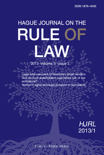
Hague Journal on the Rule of Law
Scope & Guideline
Illuminating the vital intersections of law and governance.
Introduction
Aims and Scopes
- Exploration of Rule of Law Principles:
The journal serves as a platform for in-depth exploration of the fundamental principles underpinning the rule of law, including judicial independence, accountability, and the relationship between law and democracy. - Interdisciplinary Approaches:
It employs interdisciplinary methodologies, drawing from law, political science, sociology, and international relations, thereby enriching the analysis of legal systems and their societal implications. - Focus on Global and Regional Perspectives:
The journal emphasizes both global and regional perspectives on the rule of law, examining case studies from various jurisdictions, particularly in the context of Europe, Central and Eastern Europe, and post-communist states. - Engagement with Contemporary Issues:
It addresses contemporary issues such as democratic backsliding, populism, and the impact of crises (e.g., health emergencies) on legal frameworks, providing timely insights into current challenges facing the rule of law. - Promotion of Comparative Legal Studies:
The journal promotes comparative legal studies, facilitating discussions on the effectiveness of rule of law mechanisms across different legal cultures and systems.
Trending and Emerging
- Democratic Backsliding and Populism:
There is a marked increase in discussions surrounding democratic backsliding and the impact of populism on the rule of law, particularly in Central and Eastern Europe, highlighting the need for critical analysis of contemporary governance. - Impact of Crisis on Legal Frameworks:
Recent publications emphasize the effects of crises, such as the COVID-19 pandemic, on legal systems and the rule of law, revealing how emergencies challenge existing legal norms and principles. - Transnational Legal Dynamics:
The journal increasingly explores transnational legal dynamics, with a focus on how international and regional legal frameworks interact with national rule of law standards, reflecting globalization's influence on legal governance. - Judicial Independence and Accountability:
A growing emphasis on the importance of judicial independence and accountability is present, especially in light of recent challenges faced by judicial systems in various countries, reinforcing the need for robust legal institutions. - Role of Non-State Actors:
Emerging themes include the role of non-state actors, such as corporations and civil society organizations, in shaping the rule of law, indicating a shift towards recognizing diverse influences on legal norms and practices.
Declining or Waning
- Historical Perspectives on Rule of Law:
While historical analyses of the rule of law have been significant, there appears to be a waning focus on purely historical perspectives, with more attention now given to contemporary and pressing issues. - Theoretical Discussions without Practical Applications:
There seems to be a decline in purely theoretical discussions that do not connect with practical implications or contemporary legal challenges, as scholars increasingly seek to address real-world issues. - Nationalistic Perspectives on Law:
Themes centered around strictly nationalistic perspectives on the rule of law may be diminishing as the journal shifts towards more transnational and global considerations, particularly in light of European integration. - Simplistic Narratives of Rule of Law:
There is a noticeable decrease in simplistic narratives that portray the rule of law as a binary concept, with the journal moving towards more nuanced discussions that consider complex realities and challenges.
Similar Journals

Revista Juridica de Castilla y Leon
Bridging Legal Theory and Practice in SpainRevista Juridica de Castilla y Leon is a prestigious academic journal dedicated to advancing legal scholarship in the field of law and governance. Published by the JUNTA CASTILLA & LEON, CONSEJERIA PRESIDENCIA & ADM TERRITORIAL, this journal plays a vital role in disseminating high-quality research and foster dialogue among legal practitioners, researchers, and students alike. Since transitioning to Open Access in 2003, it has removed barriers to knowledge, allowing a global audience uncontrolled access to innovative legal studies and practices. With its ISSN 1696-6759 and E-ISSN 2254-3805, the journal is committed to publishing articles that address contemporary issues and challenges in the legal landscape, particularly those relevant to the Spanish context. As a reliable source for its readers, Revista Juridica de Castilla y Leon contributes significantly to the field of law, encouraging interdisciplinary research and collaboration to influence policy and improve legal frameworks in Spain and beyond.

AUSTRALIAN LAW JOURNAL
Your Gateway to Australian Legal ScholarshipThe Australian Law Journal, published by Lawbook Co Ltd, has long been a cornerstone in the legal scholarly community, serving as a vital resource for legal practitioners, scholars, and students since its inception. With an ISSN of 0004-9611, this esteemed journal provides a platform for a diverse array of legal discourse, ranging from analyses of contemporary law to examination of historic legal principles. Though traditionally not open access, the journal continues to uphold a commitment to excellence through a rigorous peer-review process, thus ensuring high-quality research dissemination. The journal's extensive archives reflect its long-standing relevance, covering various periods including 1974 onward, with significant contributions made between 1976 to 1978, 1986 to 1988, and 1993, among others. Engaging with this publication is essential for those seeking to advance their understanding of Australian law and its application, making it an invaluable resource for anyone involved in legal studies or practice.

Melbourne University Law Review
Connecting Scholars and Practitioners in LawMelbourne University Law Review, published by the MELBOURNE UNIV LAW REVIEW ASSOC, stands as a pivotal journal in the realm of legal scholarship in Australia and beyond. With an ISSN of 0025-8938 and an E-ISSN of 1839-3810, this esteemed publication has been a cornerstone for legal discourse since its inception. Designed to foster rigorous analysis and extensive debate, the journal covers diverse aspects of law, providing researchers, practitioners, and students an invaluable platform to engage with contemporary legal issues. The journal has demonstrated a commitment to high-quality scholarship, achieving a Q2 ranking in Law for 2023, further solidifying its importance within the academic community. Although not an open-access publication, the Melbourne University Law Review ensures that contributions remain accessible through institutional subscriptions, enhancing its reach and reinforcing its role as a critical resource for those dedicated to advancing legal knowledge and practice. For all stakeholders in the field of law—be they established academics or emerging professionals—this journal serves as a vital repository of innovative ideas and legal analysis.
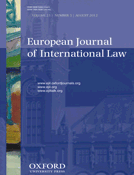
European Journal of International Law
Shaping the future of international legal scholarship.The European Journal of International Law (EJIL), published by Oxford University Press, stands as a leading platform for the dissemination of innovative research in the realms of International Law and Political Science. With an impressive ISSN of 0938-5428 and E-ISSN of 1464-3596, this prestigious journal has achieved Q1 rankings in both Law and Political Science and International Relations categories as of 2023, emphasizing its significance among contemporary scholarly publications. Spanning contributions from a diverse range of disciplines, the EJIL serves as an essential resource for researchers, professionals, and students alike, promoting critical dialogue on pressing international legal issues. Although currently not offered as an open-access journal, it continues to retain a high impact factor, as evidenced by its substantial Scopus rankings, placing it within the top percentiles in multiple categories. Its commitment to scholarly excellence is reflected in a convergence of research trends from 2005 to 2024, and it remains dedicated to fostering informed discourse on global legal frameworks and their implications.
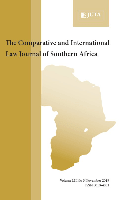
Comparative and International Law Journal of Southern Africa-CILSA
Fostering Informed Discourse on International Legal ChallengesComparative and International Law Journal of Southern Africa (CILSA) is a prestigious academic publication dedicated to advancing the understanding of comparative and international law within the Southern African context. Published by the University of South Africa, Institute of Foreign & Comparative Law, CILSA serves as a critical platform for scholars, practitioners, and students to explore significant legal issues and developments that impact the region and beyond. The journal's ISSN is 0010-4051, ensuring its visibility and accessibility within academic circles. While CILSA currently operates under a traditional publishing model, it remains committed to providing high-quality, peer-reviewed research that addresses pressing legal challenges and promotes informed discourse. With a mission to bridge the gap between different legal systems and encourage comparative analysis, CILSA is essential reading for anyone invested in the evolution of law in a globalized world.

VIRGINIA LAW REVIEW
Exploring the Intersection of Theory and PracticeVIRGINIA LAW REVIEW is a preeminent legal journal published by the University of Virginia Law Review Association, recognized for its rigorous scholarship and intellectual discourse in the field of law. With an ISSN of 0042-6601, this journal has maintained a prominent position in academia, reflected in its Q1 category ranking in law and a Scopus ranking of #167 out of 1025, placing it in the top 17% of its field. Drawing upon a rich tradition dating back to its inception in 1967 and covering a broad spectrum from legal theory to practical applications, the Virginia Law Review aims to foster innovative legal thought and engage both scholars and practitioners. While it does not currently operate under an open access model, its contributions to scholarly research are invaluable, providing insights that significantly influence legal practices and policies. Situated in Charlottesville, Virginia, at 580 Massie Road, this esteemed publication appeals to researchers, legal professionals, and students alike, making it an essential resource for anyone eager to delve into the complexities of contemporary legal issues.

Insolvency Law Journal
Illuminating trends and shaping policies.Insolvency Law Journal, published by LawBook Co Ltd, is a pivotal resource within the field of insolvency law and related disciplines. With a commitment to fostering scholarship and discussion on critical issues surrounding insolvency practices and legal frameworks, this journal serves as an essential platform for researchers, legal practitioners, and students alike. While currently not offering open access, the journal ensures the dissemination of high-quality research and case studies that contribute to the broader understanding and application of insolvency laws. Its authoritative content is enriched by an experienced editorial board dedicated to maintaining rigorous academic standards, thus promoting insightful analyses and innovative solutions to contemporary insolvency challenges. With an increasing global emphasis on effective insolvency regimes, the Insolvency Law Journal occupies a significant niche by illuminating emerging trends, shaping policy discussions, and enhancing legal education. Readers can expect detailed articles covering a diverse range of topics within the realm of insolvency law, making it a valuable addition to any legal scholar's library.

Cambridge Law Journal
Unveiling Insights into Legal ChallengesCambridge Law Journal, a prominent publication in the field of law, has made significant contributions to legal scholarship since its inception in 1921. Published by Cambridge University Press, this esteemed journal provides a critical platform for advancing discussions on contemporary legal issues, theories, and practices. With a 2023 Scopus ranking placing it in the top 42% of law journals globally, it maintains a Q2 categorization reflecting its academic rigor and relevance. Although open access options are not available, the journal remains accessible to a broad audience through university libraries and academic networks. The coverage of scholarly articles from the past to the present, specifically from the years 1921 to 1939, 1941 to 1998, and 2000 to 2024, ensures that researchers, professionals, and students can explore a rich trove of legal knowledge and perspectives. Engaging with the Cambridge Law Journal not only enables scholars to stay abreast of the latest developments in legal thought but also inspires innovative approaches to understanding and addressing legal challenges in today's complex world.
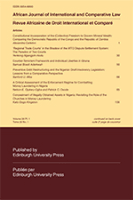
African Journal of International and Comparative Law
Bridging Theory and Practice in African LawAfrican Journal of International and Comparative Law is a distinguished publication that serves as a vital forum for scholarly discourse in the fields of international and comparative law, with a specific focus on legal issues pertinent to the African continent. Published by Edinburgh University Press, this journal boasts a respectable impact factor and finds its reputation bolstered by its strategic ranking within the Q3 category of law, according to Scopus metrics, where it occupies the 681st rank out of 1025 journals. Although it does not currently offer open access, the journal remains committed to fostering legal scholarship and providing critical insights that bridge the gap between theory and practice. The journal's coverage encompasses scholarly articles, case studies, and analyses of contemporary legal challenges from 2005 to 2024, making it an indispensable resource for researchers, practitioners, and students dedicated to advancing their understanding of international and comparative legal frameworks in the African context. The editorial team encourages submissions that contribute to the dialogue on legal reforms, human rights, and the impact of globalization on African law.
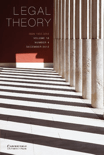
Legal Theory
Cultivating Critical Insights in Legal TheoryLegal Theory, published by Cambridge University Press, stands as a significant academic journal dedicated to the exploration of the conceptual foundations and implications of law within the wider realm of philosophy. Established in 1995 and maintaining a consistent publication record through 2023, the journal has garnered a reputation for its high-quality scholarly contributions, reflected in its impressive rankings: Q2 in Law and Q1 in Philosophy as of 2023. With an impactful presence in the Scopus Ranks, Legal Theory is positioned 158th in Philosophy and 337th in Law, highlighting its relevance and influence—especially within the arts and humanities. This journal serves as a critical platform for researchers, professionals, and students who seek to engage with the intricate interplay between legal norms and philosophical inquiries. Though not open access, it offers a wealth of knowledge that is integral to advancing discourse in legal philosophy, making it an essential resource for those looking to deepen their understanding of contemporary legal theories and their implications.